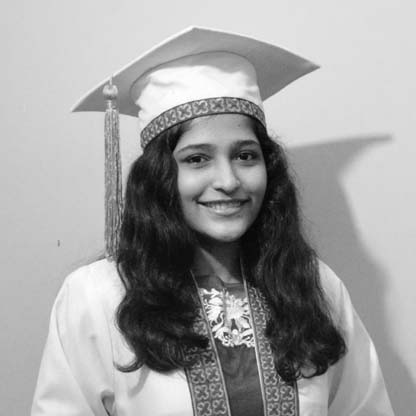
MADIHA NASEERUDDIN MEGHANI
Aspiration Statement
I want to pursue my postgraduate degree in Religious Studies and Humanities as I aspire to become a scholar. Apart from that, I am also interested in South Asian Literature and the field of curriculum designing and would want to explore that aspect at some point in my career too.
Core Skills
- Qualitative Research
- Transcribing data from Urdu in English and Vice Versa
- Research Methods such as Focused Groups, Interviews, Participant Observation
- Performance Poetry
Academic Awards / Achievements
- The Institute of Ismaili Studies - MA Islamic Studies & Humanities
- Founding Member of Aaraish-e-Khayaal Club (Urdu Prose and Poetry) Habib University
Experience
Leadership / Meta-curricular
- Mind Boggle Chess and Scrabble Club Habib University - Member
Internship / Volunteer Work
- Family Educational Services Foundation - Program Coordinator
- Freelance - Content Writer
- Gulshan-e-Noor Religious Education Centre - Research Assistant
- Indus Earth Trust - Junior Guide Guider
- World Memon Foundation - HR and Research Assistant
- SPLASH Program, Habib University, Karachi - Program Assistant
Publications / Creative Projects
- Poetry published in Arzu Anthology in March 2019 titled “Mei Mard Ban’na Chahti hun”.
- Participated in dramatic readings of Faiz’s poetry and letters at Faiz Festival.
Final Year Project
Project Title
Authoritative Structures of Student Life at Habib University and of Council in Ismaili Community
Description
Bureaucratic systems that are functional in Pakistan have a complex structure. Keeping these structures in mind that are followed at the government level in Pakistan, it is worthy to note how different bureaucratic structures at smaller level work and in that, how other aspects such as, volunteerism, education, and social standing play their role in moulding these structures. For the aforementioned purpose, two well-structured bureaucratic systems were analyzed closely and studied in depth. These two systems are the Department of Student Life at Habib University and The Council in Ismaili Community. These two systems were selected on the basis of similarities that were recognized before and during the research. However, the main purpose was to identify how both the systems in place have a set of rules which helps them in working efficiently while being a part of the bureaucracy that cannot be detached from the institutes itself. (Group Project)